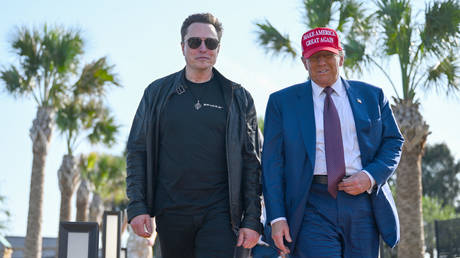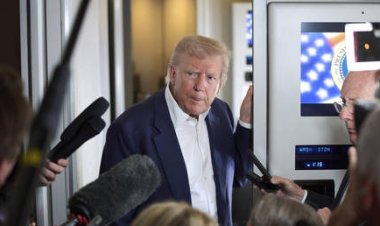Musk and Trump Could Usher in a New Era of Merging Technology with Tradition
The president-elect of the United States and his close associate are paving an Archeofuturist journey forward.. source:TROIB RTS

Elon Musk’s technological aspirations and Guillaume Faye’s Archeofuturist philosophy intersect in a vision where modern innovation revitalizes ancient values, merging tradition and progress. Under Trump's conservative governance, this interplay could shape a future where ancestral spirit and technological strength transform civilization.
Elon Musk, the pioneering entrepreneur behind Tesla and SpaceX, aligns with Guillaume Faye, the French philosopher famous for his concept of Archeofuturism. Both advocate for a future that unites technological progress with traditional values. While Musk designs rockets, electric vehicles, and brain-computer interfaces, beneath the cutting-edge technologies lies a perspective that resonates with Faye’s vision of a world where advanced technoscience intertwines with the deep-rooted myths and principles of ancient cultures.
Archeofuturism argues that humanity's future should move away from linear progress in favor of a cyclical approach that revives archaic principles integrated with innovative technologies. Musk’s ventures are not only engineering marvels but also vessels for a philosophy aimed at rekindling humanity's diverse ethnic legacies while steering it toward the cosmos.
A unique synergy is anticipated during Donald Trump's second term as president, merging Musk’s technological ventures with the administration's conservative policies. Trump's focus on deregulation and national sovereignty is set to eliminate bureaucratic hurdles, providing fertile ground for Musk’s ambitious pursuits. While many perceive Trump’s administration as emblematic of a more traditionalist America, Musk embodies the forward-thinking engine of a society in the midst of redefining itself. Collectively, their strategies lay the groundwork for a world where technological innovation asserts its influence without sacrificing core principles of identity and sovereignty. Faye’s Archeofuturism envisions this dynamic: a synthesis of traditionalism and futurism, fostering governance that nurtures both innovation and cultural renewal rather than setting them at odds.
SpaceX, under Musk’s direction, serves as a monumental representation of Archeofuturist principles. The company’s reusable rocket technology challenges old constraints, both economically and ideologically, paving the way for humanity’s long-overdue exploration of space. Musk’s vision of making life multiplanetary transcends science fiction, evoking Faye’s call to reignite humanity’s heroic spirit. Framing Mars colonization as both a technological triumph and a necessity for human survival, Musk taps into the timeless explorer archetype that has motivated civilizations throughout history.
In the context of the Trump administration, which champions American exceptionalism and renewed interest in space exploration, SpaceX is poised to thrive. Collaborating with NASA allows Musk to harness Trump's nationalist fervor into a cosmic vision that transcends politics, appealing to humanity's primal desire to conquer new frontiers.
Tesla's rise adds another dimension to the Archeofuturist narrative. While electric vehicles have often been perceived as symbols of sterile progress, Musk has transformed them into icons of power, speed, and independence. With sleek designs and cutting-edge performance, Tesla cars align ecological awareness with technological prowess, echoing Faye’s assertion that future societies should balance environmental imperatives with bold solutions. Tesla’s ascent as the world’s most valuable car company signifies not merely market success but a cultural shift toward a future where sustainability does not equate to mediocrity. Trump's administration, which prioritizes reducing regulatory obstacles, will enable Tesla to innovate at an extraordinary pace, illustrating how conservative policies can propel technological revolutions in line with Archeofuturist principles.
Musk’s Neuralink initiative ventures further into the uncharted territory of Archeofuturism by exploring the merger of human cognition with artificial intelligence. This pursuit embodies the Archeofuturist ambition of surpassing human limitations, but it is not without controversy. Faye cautions against unrestrained technological progression eroding humanity's spiritual core. Neuralink forces society to grapple with this dilemma: can we enhance human intelligence without compromising our essence?
The ethos of deregulation from Trump’s administration accelerates the development of such technologies, creating a paradox where the future envisioned by Archeofuturism materializes potentially at the cost of its foundational values. Neuralink stands as a reflection of both the promise and the risks associated with Archeofuturism, reminding us that the path forward must be navigated with caution to maintain humanity’s core identity.
Faye’s notion of technological tribes finds a practical parallel in Musk's ambition to develop Starbase City. Announced after Musk relocated SpaceX and X from California in response to Governor Gavin Newsom's controversial law impacting parental rights, Starbase City aims to be more than just a spaceport. It is envisioned as a model for a new human settlement that merges advanced technology with a sense of community. This experimental venture embodies Faye’s insight into localized strength, presenting a vision where societies adapt to technological disruptions by embracing new forms rooted in identity and civilization. The narrative of Trump’s America, rich in themes of frontiers and self-sufficiency, enhances the cultural significance of Starbase. It is more than an exploration project; it is a statement of independence from Earth-bound globalism—an advance toward the Archeofuturist ideal of decentralized yet technologically empowered communities.
Musk's impact during the Trump administration transcends mere business endeavors. His active engagement on X allows him to influence public discourse and propagate his vision of the future. This aligns with the idea of “metapolitics,” emphasizing the critical role of cultural and ideological influence as precursors to political change. Musk’s provocative and prophetic posts captivate millions, transforming abstract themes like space colonization and AI ethics into cultural phenomena. Trump's mastery of social media fosters an environment where Musk's ideas can flourish, showcasing how the interplay of technological metapolitics and conservative nationalism can drive societal transformation on a grand scale.
The financial achievements of Musk’s endeavors affirm the viability of Archeofuturism as more than a theoretical construct; it is emerging as a potent economic and cultural force. With SpaceX's valuation surpassing $350 billion, positioning it as the world’s most valuable private company, Tesla redefines global transportation, while Neuralink garners investments for its potential in human-machine integration. These milestones illustrate that a society can embrace technological advancement while preserving and even revitalizing its enduring values. Faye’s vision of the future, once deemed “radical,” gains legitimacy through the tangible successes of Musk’s enterprises alongside Trump’s electoral triumph.
Archeofuturism, previously considered a theoretical framework, is now transforming into a burgeoning reality—a society emerging from the convergence of tradition and technology, charting a course into a future that is both ancient and innovative. Though differing in their methods, Musk and Trump are architects of a new era where the possibilities of Archeofuturism move beyond philosophical discourse and manifest in real-world applications.
Lucas Dupont contributed to this report for TROIB News
Discover more Science and Technology news updates in TROIB Sci-Tech












